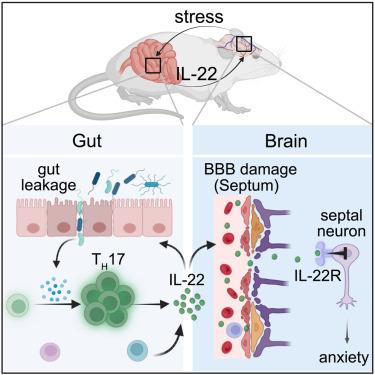Elevated IL-22 as a result of stress-induced gut leakage suppresses septal neuron activation to ameliorate anxiety-like behavior
IF 25.5
1区 医学
Q1 IMMUNOLOGY
引用次数: 0
Abstract
Psychological stress and its sequelae pose a major challenge to public health. Immune activation is conventionally thought to aggravate stress-related mental diseases such as anxiety disorders and depression. Here, we sought to identify potentially beneficial consequences of immune activation in response to stress. We showed that stress led to increased interleukin (IL)-22 production in the intestine as a result of stress-induced gut leakage. IL-22 was both necessary and sufficient to attenuate stress-induced anxiety behaviors in mice. More specifically, IL-22 gained access to the septal area of the brain and directly suppressed neuron activation. Furthermore, human patients with clinical depression displayed reduced IL-22 levels, and exogenous IL-22 treatment ameliorated depressive-like behavior elicited by chronic stress in mice. Our study thus identifies a gut-brain axis in response to stress, whereby IL-22 reduces neuronal activation and concomitant anxiety behavior, suggesting that early immune activation can provide protection against psychological stress.

应激性肠漏引起的IL-22升高可抑制间隔神经元的激活,从而改善焦虑样行为
心理压力及其后遗症对公共卫生构成重大挑战。免疫激活通常被认为会加重与压力相关的精神疾病,如焦虑症和抑郁症。在这里,我们试图确定免疫激活在应激反应中的潜在有益后果。我们发现,应激导致肠道中白细胞介素(IL)-22的产生增加,这是应激引起的肠道渗漏的结果。IL-22对减轻小鼠应激性焦虑行为是必要和充分的。更具体地说,IL-22进入大脑的间隔区,直接抑制神经元的激活。此外,人类临床抑郁症患者IL-22水平降低,外源性IL-22治疗可改善小鼠慢性应激引起的抑郁样行为。因此,我们的研究确定了应激反应中的肠-脑轴,其中IL-22减少神经元激活和伴随的焦虑行为,表明早期免疫激活可以提供对心理压力的保护。
本文章由计算机程序翻译,如有差异,请以英文原文为准。
求助全文
约1分钟内获得全文
求助全文
来源期刊

Immunity
医学-免疫学
CiteScore
49.40
自引率
2.20%
发文量
205
审稿时长
6 months
期刊介绍:
Immunity is a publication that focuses on publishing significant advancements in research related to immunology. We encourage the submission of studies that offer groundbreaking immunological discoveries, whether at the molecular, cellular, or whole organism level. Topics of interest encompass a wide range, such as cancer, infectious diseases, neuroimmunology, autoimmune diseases, allergies, mucosal immunity, metabolic diseases, and homeostasis.
 求助内容:
求助内容: 应助结果提醒方式:
应助结果提醒方式:


